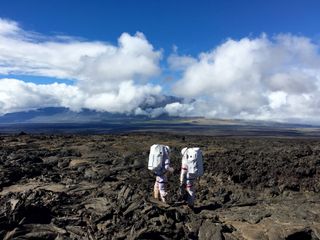Astronauts Explain How Space Colonists Could Survive on Another 'Strange Rock'
If humans want to avoid going extinct like the dinosaurs, we will ultimately have to learn to live in space and to colonize other worlds. But would living on another planet truly preserve our species, or would a new environment drive us to evolve into something new?
In a new episode of "One Strange Rock," airing tonight (April 30) on the National Geographic Channel, eight astronauts explain why they think humans should colonize space — and how doing so could affect our bodies.
The human body faces many obstacles during spaceflight. At the International Space Station (ISS), astronauts' bones and muscles weaken as they work in weightlessness for months at a time. Because their bodies don't experience gravity, bodily fluids shift upward, causing eyesight changes that are sometimes permanent. [6 Everyday Things That Happen Strangely in Space]
Cosmic radiation sometimes triggers "light flashes" in the astronauts' eyes, Canadian astronaut Chris Hadfield explains in the show. On long-duration deep-space missions, radiation could even damage our DNA, causing cancer and brain damage.

Exposing ourselves to a toxic and potentially lethal environment in an effort to prolong the existence of our species might seem counterproductive. However, if the humans naturally adapted a way to deal with radiation, it wouldn't be the first time.
"One Strange Rock" will take viewers to Chernobyl, a nuclear power plant in Ukraine that exploded in 1986. Radiation exposure after the explosion killed people and animals alike, but some species have adapted to the radiationby producing more antioxidants. Humans, too, have been known to adapt to radiation exposure when regularly working with X-rays, for example.
If our bodies did somehow adapt to radiation, or if humans devised a way to shield ourselves from it, we still can't guarantee that our bodies will be able to survive away from Earth. Humans and every other species on our planet have evolved to thrive in an environment that will be difficult to find anywhere else in our nook of the cosmos.
Get the Space.com Newsletter
Breaking space news, the latest updates on rocket launches, skywatching events and more!
But this doesn't mean that space colonists are doomed. Just as all of Earth's species have done for billions of years, humans can adapt to new environments, the astronauts of "One Strange Rock" suggest.
"Even if we survive the journey and make the place feel like home, we still might not save our species," Will Smith, who hosts the show, says in the episode. "Just by being there we might turn into something else."
Catch this episode of "One Strange Rock" on the National Geographic Channel tonight (April 30) at 10 p.m. EDT/PDT (9 p.m. CDT).
Email Hanneke Weitering at hweitering@space.com or follow her @hannekescience. Follow us @Spacedotcom, Facebook and Google+. Original article on Space.com.
Join our Space Forums to keep talking space on the latest missions, night sky and more! And if you have a news tip, correction or comment, let us know at: community@space.com.

Hanneke Weitering is a multimedia journalist in the Pacific Northwest reporting on the future of aviation at FutureFlight.aero and Aviation International News and was previously the Editor for Spaceflight and Astronomy news here at Space.com. As an editor with over 10 years of experience in science journalism she has previously written for Scholastic Classroom Magazines, MedPage Today and The Joint Institute for Computational Sciences at Oak Ridge National Laboratory. After studying physics at the University of Tennessee in her hometown of Knoxville, she earned her graduate degree in Science, Health and Environmental Reporting (SHERP) from New York University. Hanneke joined the Space.com team in 2016 as a staff writer and producer, covering topics including spaceflight and astronomy. She currently lives in Seattle, home of the Space Needle, with her cat and two snakes. In her spare time, Hanneke enjoys exploring the Rocky Mountains, basking in nature and looking for dark skies to gaze at the cosmos.
